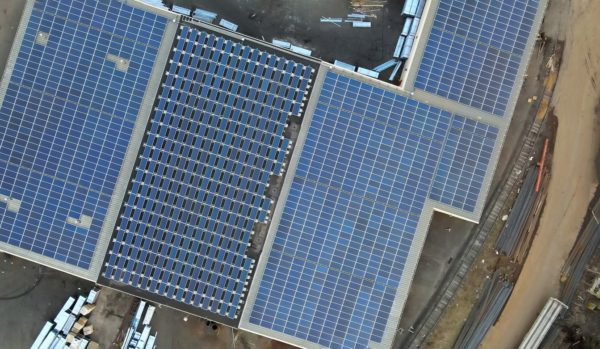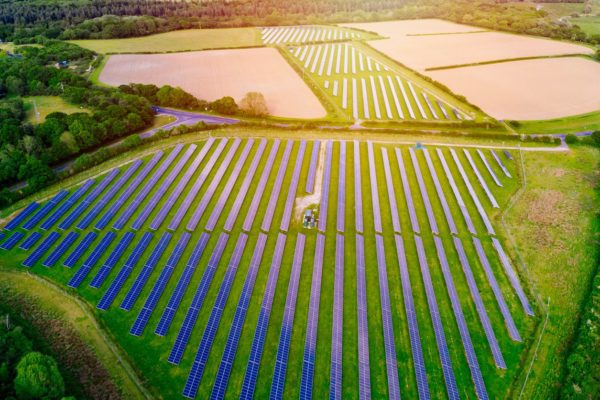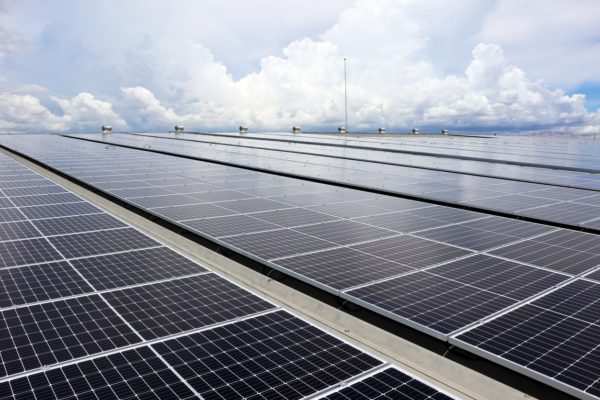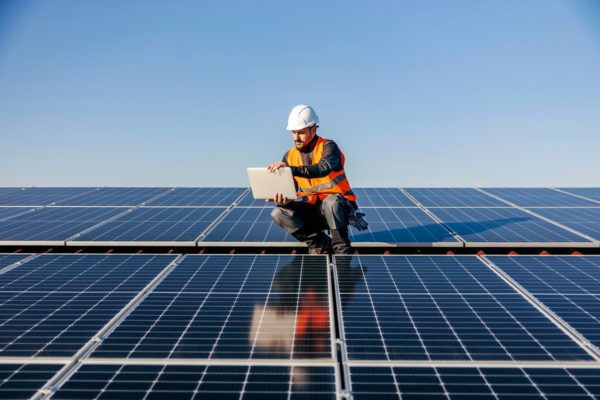
Solar power is renewable energy used globally to generate electricity, causing no harm to the environment. This process is economic and can bear the burden of supplying power to the whole area if installed on a big scale.
What is a Commercial Solar System?

Unlike its more common application in homes, commercial solar refers to solar energy intended for enterprises. Solar power is an excellent, clean, renewable energy source and a highly successful energy-saving technology.
The term commercial solar or commercial and industrial scale solar is frequently used to describe solar power that serves a wide range of clients, from governments and major corporations to small businesses and educational institutions.
Installation Process Of Commercial Solar System
- Commercial solar panels in off-grid or isolated areas can power industrial facilities.
- Sign boards and other commercial boards can be lit up through panels on mountains and roofs of different areas, and these can be lit at night by energy-saving batteries.
- In workplaces and enterprises, commercial solar panels can be utilized to heat water as well as the ventilation air.
Why Go For Commercial Solar Systems?

The commercial solar farm is a great alternative to achieve a clean environment. This process of energy-making requires little maintenance with no carbon emission. Businesses can significantly lower their electricity bills and carbon impact using commercial solar panels, also known as solar arrays.
You can set up solar systems on the roofs of your commercial buildings to produce enough solar energy to meet the buildings’ energy requirements. Solar-powered electricity generation can help you save as much as 25% on your utility bills.
How Do Commercial Solar Systems Work?
Commercial solar panels use sunlight to gather clean, renewable energy that they turn into electricity that powers electrical loads. Numerous individual solar cells comprised of layers of silicon, phosphorous, and boron are stacked in a grid-like arrangement to form solar panels.
The power produced by solar energy is transmitted into inverters. Commercial inverters can usually store power up to 2.5 kW to 250kw.
Where to Install Commercial Solar Panels?

Since commercial buildings have adequate open space for a significant number of solar panels to be installed and can generate enough solar electricity to cover all of their energy needs, commercial solar panels can be installed there.
Commercial solar panels are solid and require very little maintenance. They have a lifespan of over 15-20 years. These generate ample energy during the day, and power can be stored at night in grid stations. The electricity generated by the system is entirely free.
Advantages of the Commercial Solar System

Given the escalating energy cost, switching to solar is a wise move. Here’s how a commercial solar system can help you in this regard.
1. Decreased Functional Cost
PV solar energy is a widely used, accessible, and reasonably priced energy source that allows businesses to generate power rather than buy electricity from grid stations or other external energy brokers.
Businesses can raise the value of their real estate by constructing a clean energy power plant onsite by installing a commercial solar-powered system, which allows them to become one of their electricity suppliers.
Solar installations can help stabilize electricity costs with more predictable revenue flows than external energy acquired at widely billed rates. Think of them as a multi-decade investment in a company’s bottom line.
Property managers may quickly estimate project costs and future energy production to assess an installation’s total return on investment due to the generally low maintenance costs associated with solar systems.
And while the prospect of going solar may deter some property owners due to the initial costs, many incentives and legislation are aimed at making it easier for large enterprises to embrace solar energy solutions.
2. The Federal Investment Tax Credit
Sometimes known as the solar ITC, it is the main incentive that has decreased the cost of solar installation in the United States during the past ten years. Qualified enterprises can deduct a significant portion of system cost from the federal income tax paid using the ITC.
Unfortunately, institutions like schools, churches, and other organizations are not eligible to apply for the Investment Tax Credit if they don’t submit yearly income tax returns. In some instances, third-party ownership or Tax Equity Financing can assist firms without a significant tax liability to still take advantage of the ITC and benefit from a PV system with a lower initial outlay.
3. Accelerated System Depreciation
Depreciation may be available to any company that claims the solar ITC to reduce the overall cost of a new installation. Businesses can deduct the depreciation costs of a system for five years, as opposed to throughout the system’s lifespan, by using a Modified Accelerated Cost-Recovery System (MACRS).
Businesses can reduce the time it takes for a solar project to reach its break-even position when adoption costs equal the savings from not using traditionally purchased energy by utilizing any tax deductions, tax, and rebates that may be available.
4. Increased Energy Accessibility and Control
Companies based on solar energy systems will be less dependent on public utility providers and other outside sources to supply their energy demands because they can produce sustainable electricity onsite. Simple grid-associated commercial solar systems must shut down during a blackout if electricity cannot be safely supplied back into the local power grid.
For this reason, battery backups are being incorporated into many commercial solar power systems. A solar system that includes storage can operate independently as a microgrid, allowing electricity to be continually generated, stored, and used across the property.
Companies can strengthen their energy resilience by operating off the grid without being concerned that operations would come to a complete halt in the event of a local power failure.
5. Smart Energy Management
This smart power system allows your grid to use energy and save energy for any unwanted power shortage. It helps businesses to have practical use of energy. They can save power and use it when the rates are high or in blackouts.
6. Meeting ESG goals
Most importantly, switching to solar energy can assist all organizations in achieving their environmental, social, and governance (ESG) objectives. Going solar is about more than just cost savings, even though it will probably show a financial benefit on a company’s balance sheet.
Solar power is a very efficient solution for businesses to achieve sustainability goals since it is a measurable, easily quantified green energy asset. Commercial solar energy reduces a building’s carbon footprint as soon as it starts operating; some call it immediate decarburization.
Additionally, most solar-powered systems are straightforward and don’t require significant adjustments to regular corporate operations. In most cases, adding an installation to a property won’t interfere with regular operations, allowing a business to carry on as usual.
The overall environmental impact of a solar power installation can be increased in conjunction with other suggested property modifications, such as modernized appliances and updated building features, typically preceded by an energy efficiency audit.
7. Meet The Triple Bottom Line Of The Business
The triple bottom line is the people, planet, and profit impacted by your organization’s activities. By becoming solar, you can be confident that your company will have a good impact on all its stakeholders regarding social, environmental, and economic factors.
8. Contribution Towards Planet
In today’s global market, a company’s dedication to sustainable business practices is valuable at every level, from the final consumer to the board of directors.
With the help of the solar system, businesses can demonstrate their commitment to the environment and reduce greenhouse gas emissions. The commercial solar system can also give businesses competitive edges that will help them survive in the long run. And help you reduce costs.
9. Acquire the Green Business Label
You can reduce your carbon footprint, reduce greenhouse gas emissions, and demonstrate your commitment to sustainability with commercial solar. By switching to solar energy, your company will be environmentally conscious and concerned about the future of its stakeholders.
Top Tips for Business Owners on Commercial Solar System Maintenance

Solar panels are a long-term business investment, but to assure advantages for decades, they need regular maintenance. The following maintenance advice can be used by solar owners in addition to yearly inspections to guarantee effective clean energy output all year round.
- Don’t keep the solar panels under the shade
- Monitor the solar inverters
- Record the performance of your solar panels
- Clear obstructions from the solar panels’ surface
Coldwell Solar Can Design, Install and Maintain Your Commercial Solar System
Although the concept has been around for centuries, solar power’s importance has increased dramatically during the last two to three decades. A commercial solar energy system is an excellent method for businesses of all kinds to cut operating expenses and lessen their total environmental impact, which is good for the company and the environment.
Solar systems can improve a company’s financial and environmental stability without disrupting day-to-day operations with onsite and clean power generation and storage. Contact Coldwell Solar to get a quote for your commercial solar project.

